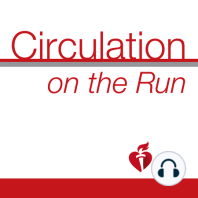18 min listen
Circulation May 4, 2021 Issue
ratings:
Length:
28 minutes
Released:
May 3, 2021
Format:
Podcast episode
Description
Dr. Carolyn Lam: Welcome to Circulation on the Run, your weekly podcast summary and backstage pass to The Journal and its editors. We're your co-hosts, I'm Dr. Carolyn Lam, associate editor from the National Heart Center and Duke National University of Singapore. Dr. Greg Hundley: And I'm Dr. Greg Hundley, associate editor, director of the Pauley Heart Center at VCU Health in Richmond, Virginia. Well Carolyn, it's another double feature Tuesday and today we get to discuss two articles. One, some insights from the CREDENCE trial. And second, another article about left atrial appendage closure devices, some results from the PINNACLE FLX trial. But before we get to those, how about we grab a cup of coffee and dive into some of the other really interesting articles in this issue? Would you like to go first? Dr. Carolyn Lam: I would, because this next paper, right up your alley and I'm sure you'll like it. But first, we talk about mitral valve prolapse. Now, we know that's a frequent disease that can be complicated by mitral regurgitation, heart failure, arterial embolism, rhythm disorders, and death. Left ventricular replacement myocardial fibrosis is a marker of maladaptive remodeling and has been described in patients with mitral valve prolapse. However, the implications of this finding remain scarcely explored. So these authors, led by Dr. [Le] Tourneau from Hôpital Laennec in France, aimed at assessing the prevalence, pathophysiological and prognostic significance of left ventricular replacement myocardial fibrosis through late gadolinium enhancement by cardiac magnetic resonance in 400 patients with mitral valve products. I bet you like that, right Greg? Dr. Greg Hundley: Oh my gosh Carolyn, not only a favorite topic of cardiovascular magnetic resonance, but this is a really large patient population with mitral valve prolapse that underwent CMR. So tell us, what did they find? Dr. Carolyn Lam: So replacement myocardial fibrosis was observed in 110 patients, so that's 28% of the patients. It was associated with mitral valve apparatus alterations, left ventricular remodeling, and ventricular arrhythmia. The ventricular arrhythmias were more frequent in patients with replacement fibrosis, but were not associated with the grade of mitral regurgitation. In patients with trace or mild mitral regurgitation, the presence of replacement myocardial fibrosis was nonetheless associated with specific mitral valve apparatus alteration at normal left ventricular dilatation, not explained by volume overload and ventricular arrhythmias, suggesting the presence of a mitral valve prolapse-associated cardiomyopathy. Dr. Greg Hundley: Wow Carolyn, really interesting. So the late gadolinium enhancement and the evidence therefore of replacement myocardial fibrosis that was identified by CMR, maybe this particular study is suggesting that we might want to integrate that into the clinical workup of patients with mitral valve prolapse. Very interesting work, and great job on that fantastic CMR presentation. I must say, got to recruit you into the club. Dr. Greg Hundley: Well, my next paper is another wonderful paper from the world of basic science and it comes from Dr. Douglas Lewandowski at the Ohio State University College of Medicine. So Carolyn, the failing heart is energy starved with impaired oxidation of long chain fatty acids at the level of reduced carnitine palmitoyltransferase-1, or CPT-1, activity at the outer mitochondrial membrane. Recent work shows that elevated ketone oxidation and failing hearts as an alternate carbon source for oxidative ATP generation. So Carolyn, these authors hypothesized that another short chain carbon source, short chain fatty acids that bypass CPT-1, could similarly support energy production in failing hearts. Dr. Carolyn Lam: Wow. Okay, so what did they find? Dr. Greg Hundley: So Carolyn, the failing heart oxidizes short-chain fatty acids more readily than ketones, with short-chain fatty acids also displacing
Released:
May 3, 2021
Format:
Podcast episode
Titles in the series (100)
Circulation January 23, 2018 Issue by Circulation on the Run
